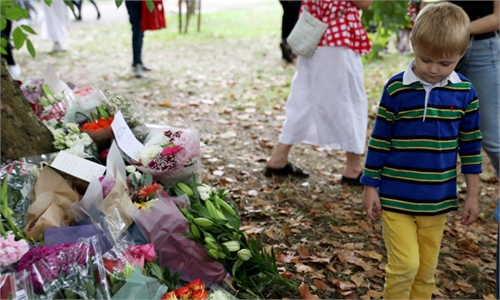Commonwealth realms reignite debates over monarchy after Queen’s demise as system faces crossroads

People line up outside St Giles' Cathedral in Edinburgh, Scotland on September 13, 2022, to pay their respects before the coffin of Queen Elizabeth II lying at rest. Photo: AFP
The death of Queen Elizabeth II, the UK's longest-reigning monarch for seven decades, has reignited debates in many of the 15 British Commonwealth realms on whether it is time to replace the British monarch with an elected head of state, which puts the long-term existence of the Commonwealth into question, analysts said, citing growing calls to completely get rid of the remnants of the colonial era and embrace full independence and the decline of Britain's strength.
With the Queen's demise, 73-year-old Charles III ascended to the British throne and was proclaimed king at St James's Palace in London on Saturday. He was also pronounced head of state in 14 other Commonwealth realms, including Canada, Australia, New Zealand and some island nations in the Caribbean and South Pacific.
King Charles was proclaimed at a time when Britain faces multiple challenges, including a new government led by Prime Minister Liz Truss who as Conservative Party leader inherits a huge mess she needs to tackle, from an ailing economy to the cost of living crisis, and growing voices in Scotland and Northern Ireland who desire to leave the UK. Analysts noted that Commonwealth realms are at a crossroads.
The long reign of Queen Elizabeth II, whether out of personal image, charisma, or her devotion to duty to some extent stabilized the Commonwealth system worldwide. After her death, many within the realms have revisited the thought of leaving, Cui Hongjian, director of the Department of European Studies at the China Institute of International Studies (CIIS), told the Global Times on Tuesday.
In addition to the UK, the 14 Commonwealth realms are Antigua and Barbuda, Australia, The Bahamas, Belize, Canada, Grenada, Jamaica, New Zealand, Papua New Guinea, Saint Kitts and Nevis, Saint Lucia, Saint Vincent and the Grenadines, Solomon Islands, and Tuvalu.
The king's role as monarch of these countries is generally symbolic, and he will not be directly involved in governing, as the British monarch is a head of state, not head of government.
Revived debate
While commemorating Queen Elizabeth, republican debates have been pushed to the fore in many of the Commonwealth realms. The Guardian reported that in the hours after Queen's death was announced, republican debate was "dramatically re-enlivened" and the Australian Greens leader Adam Bandt, tweeted that "Australia must move forward… we need to become a Republic."
Reuters reported on Tuesday that New Zealand Prime Minister Jacinda Ardern said no immediate steps will be taken to achieve unification but the nation may eventually become a republic.
"I've never sensed the urgency. There's so many challenges we face. This is a large, significant debate. Don't think it's one that would or should occur quickly," Ardern told reporters on Sunday. "I do believe that is where New Zealand will head in time. I believe it's likely to occur in my lifetime but I don't see it as a short-term measure or anything that is on the agenda anytime soon," Ardern said.
Campaigns for independence from the British Monarchy have been underway in Australia and New Zealand for years. The Queen's death means the end of an era with more people in Australia and other Commonwealth realms questioning the legitimacy and necessity of a monarch, Chen Hong, president of the Chinese Association of Australian Studies and director of the Australian Studies Center at East China Normal University, told the Global Times.
On Monday, Australian Prime Minister Anthony Albanese said it was "inappropriate" to discuss a referendum on becoming republic while commemorating the Queen but he did not rule out the possibility if he is re-elected, media reported. In 1999, Australia had a referendum to decide whether the country would replace Queen Elizabeth with a president and 54.87 percent voted "no" vs. 45.13 percent "yes" in the final tally.
Although some rituals of the Commonwealth are kept in Australia and some political elites remain close to the UK, public voices advocating a republic have become louder. With the Queen's death, some thorny issues, including whether to change the monarch's image on coins and notes will be addressed, Chen said.
On Tuesday, the Australian government said that the image of King Charles III would not automatically replace Queen Elizabeth II's on A$5 bank notes and it may be replaced with Australian figures, Reuters reported.
"The glory of the British Empire has long gone together with its declining global influence. Commonwealth realms will no longer be tied by the ghost of history and the public's attachment to the monarchy will remain only at a historical level. The rules of the old world are receding," Chen said.
Other Commonwealth realms, especially island nations in South Pacific and Caribbean that have suffered colonial rule, may be striving to divorce with the Commonwealth and rid themselves of the scars left by the British colonists, analysts said.
Just after Charles was proclaimed king on Saturday, Antigua and Barbuda Prime Minister Gaston Browne told ITV News that the Caribbean country will hold a referendum on transitioning to a republic and removing King Charles as head of state within the next three years.
Antigua and Barbuda used to be a British colony. It gained independence from the UK in 1981 but remained as one of the 15 countries where the British monarch is head of state.
However, observers also said that the break-away process from the Commonwealth will not happen overnight. There are uncertainties in the referendum process in some countries, as the UK has taken the Queen's death as an opportunity to continue the influence of the monarchy while emphasizing a sense of closeness and identity.
From Barbados and Jamaica to Belize, many Caribbean countries' willingness to leave the Commonwealth shows their pursuit of political independence and modern development. The British monarchy is a historical remnant of a colonial era and it will face more challenges in the modern world, Zhou Zhiwei, an expert on Latin American studies at the Chinese Academy of Social Sciences, told the Global Times.
The "divorce" trend is inevitable as the people in these countries are fighting to defend their dignity and seeking full de-colonization. After declaring independence, Caribbean nations have developed stronger relations with the US, China and other countries - this is also an impetus for these countries to seek more political independence, Zhou said.
Cui from the CIIS noted that people from former colonial countries see colonialism as a sin that harms local residents and sabotages their cultures, and most resent it. However, some elites in these countries maintain close bonds with the UK as their interests are closely aligned.
But the landscape is changing with the decline in the UK's strength, Cui noted. "The UK no longer has that much to offer to these countries, while people's resentment toward colonialism is rising as the concept itself is in conflict with the world's general trend of democratic countries.
Moreover, since the UK is at the core of the Commonwealth realms, if it fails to deliver any actual benefits to the others, either politically or economically, the realms may consider becoming a republic and even discuss leaving the Commonwealth altogether, Cui said.
Seeing the British Empire gradually reduced to a blind follower of the US in international politics, and its domestic politics becoming fragmented and divided, Commonwealth realms must consider what they can get from the system, analysts said.



